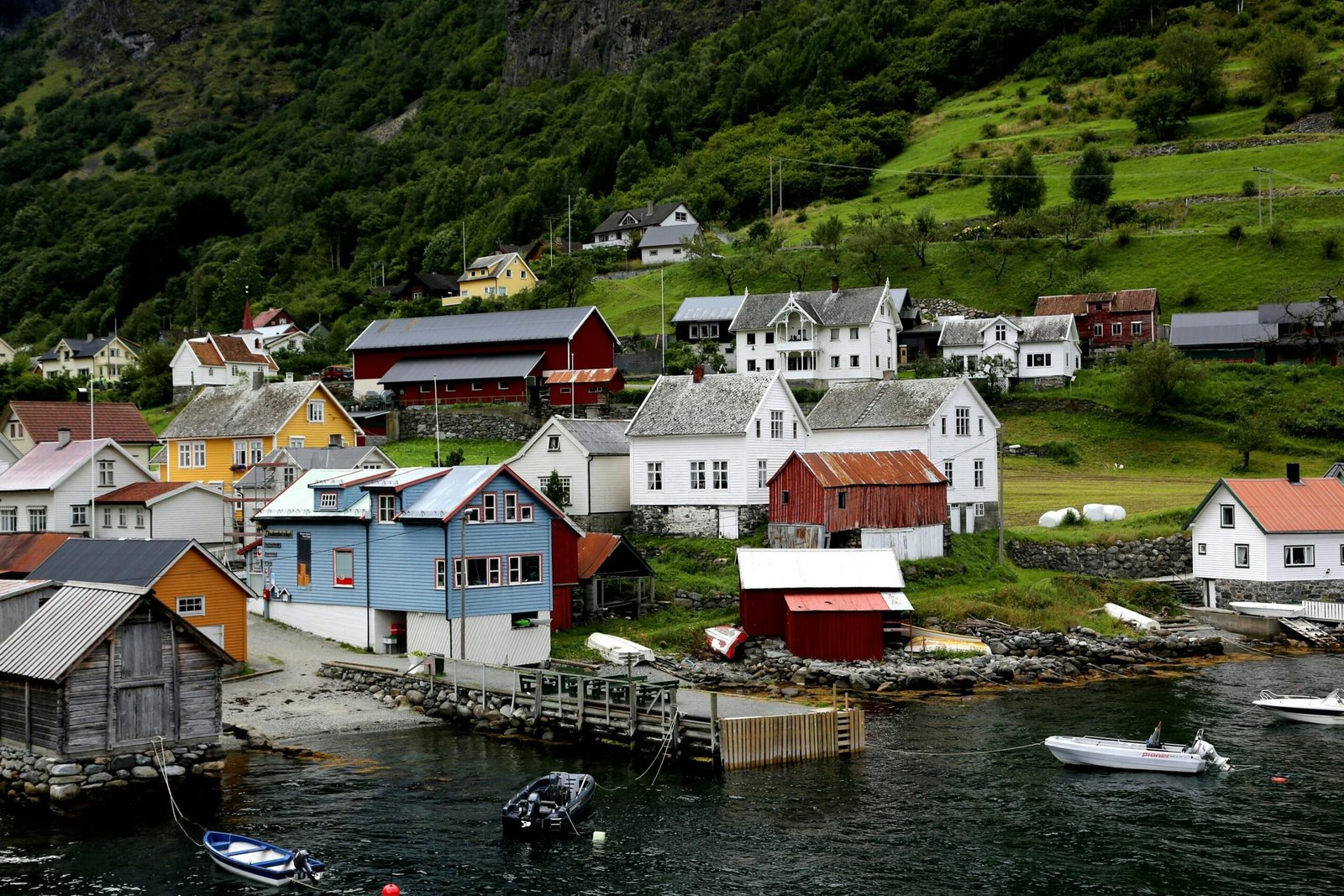Stavanger’s culinary soul is at its harborfront stalls. There, flaky smoked salmon melt on your tongue like liquid fjord gold. This coastal city, once known for its oil industry, now shines as a Stavanger food tourism hotspot. Here, Norwegian cuisine blends tradition with innovation, like ancient smoking techniques meeting modern sushi art.
Stavanger’s kitchens honor the sea’s bounty with deep respect. At dawn, fish markets overflow with cod and herring. By night, restaurants reinvent these treasures in new ways. This Stavanger culinary guide shows how a city rooted in Viking traditions now boasts Michelin-starred sushi counters using local Arctic cod. Each dish is a conversation between land and sea, past and present.
Whether enjoying lutfisk cured by ancestors or sashimi by a Tokyo-trained chef, this culinary travel to Stavanger Norway journey is full of discovery. This guide uncovers hidden gems, from family-run smokehouses to fusion bars. Here, Norway’s culinary heartbeat beats strongest.
Key Takeaways
- Stavanger merges traditional Norwegian techniques with global culinary trends.
- Explore iconic smoked salmon from historic producers and sushi spots using Arctic seafood.
- Seasonal ingredients shape menus, from spring asparagus to winter reindeer.
- Local chefs reinterpret Norwegian cuisine through cultural collaborations.
- Stavanger offers a Stavanger culinary guide experience blending adventure and gastronomy.
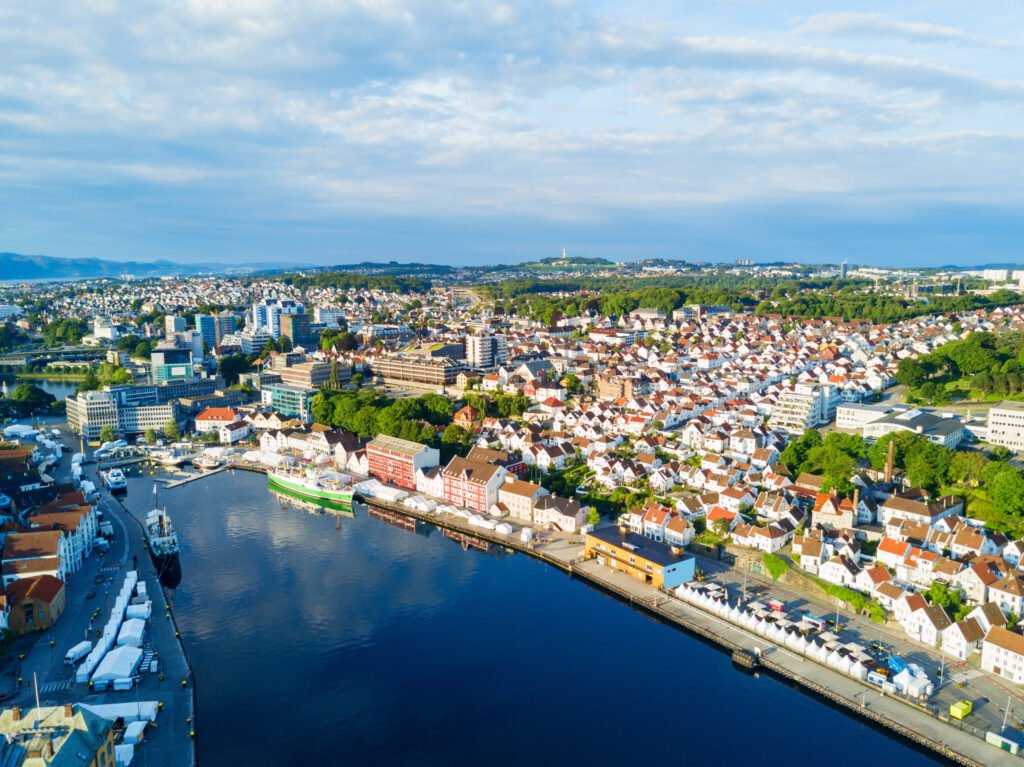
Introducing Stavanger: Norway’s Hidden Culinary Gem
Walking along Stavanger’s harbor, you smell fresh fish and sea breeze. This shows a city where old traditions meet new ideas. What was once a small fishing port is now a place where Stavanger restaurants show off Norway’s food evolution. The Stavanger dining scene today celebrates tradition while exploring new ways to do things.
The Rise of Stavanger’s Food Scene
The oil boom brought new influences, but locals kept their identity. Now, Norwegian food culture is in dishes that mix simple flavors with creativity. You can find Michelin-starred places next to old taverns, showing that old and new can live together.
How Stavanger Became a Foodie Destination
Events like the Stavanger Food Festival and chefs like Line Nilsen helped make it famous. People come to try new takes on old favorites, like Arctic char with juniper sauce. This shows the city’s serious commitment to food.
Fusion of Traditional and Modern Norwegian Cuisine
Stavanger’s chefs mix old and new in creative ways. A dish like rakfisk (fermented trout) might be smoked and served with black garlic emulsion. Here’s a table showing this mix:
| Traditional | Modern Interpretation |
|---|---|
| Rakfisk | Sous-vide fermented trout with elderflower glaze |
| Lutefisk | Crispy pan-fried cod with miso-cream sauce |
| Fårikål | Lamb ragout with burnt leek purée |
Every bite here tells a story. It’s about fishermen’s hard work and chefs’ curiosity. Here, every meal is a trip through time and taste.
The Essential Guide to Culinary Travel to Stavanger Norway
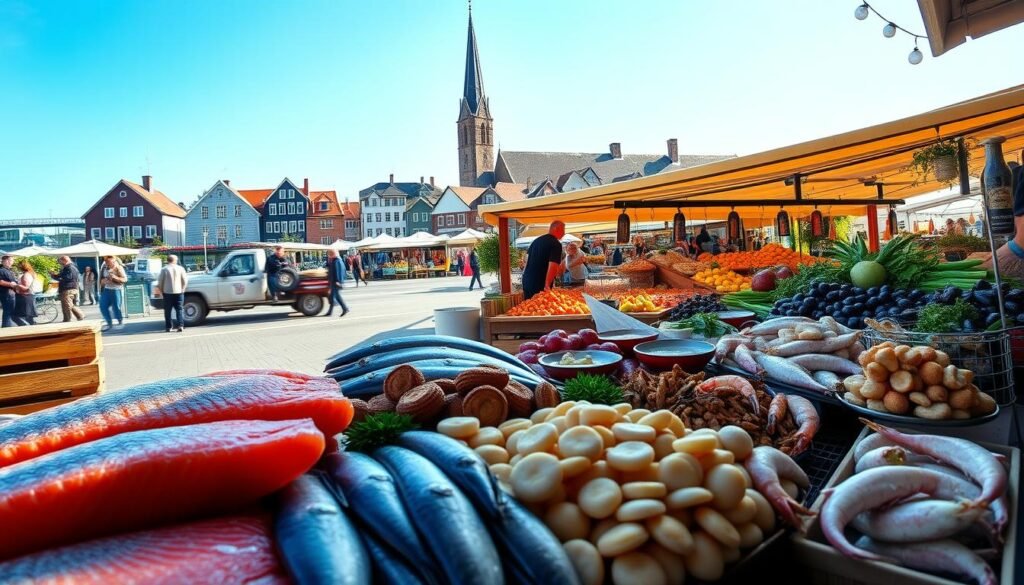
Planning a Stavanger dining guide means finding a balance. Your own adventures will show that Norwegian culinary tourism is alive in Stavanger. From seafood by the harbor to historic squares, there’s much to explore.
Start with Stavanger food tours that mix history with flavors. Follow the scent of cardamom in morning markets.
Timing is key: Spring’s rhubarb festivals and summer’s salmon tastings are highlights. Here’s a look at what each season offers:
| Season | Highlights |
|---|---|
| Spring | Asparagus festivals, fresh cod dishes |
| Summer | Outdoor harbor dinners, berry-infused cocktails |
| Autumn | Mushroom foraging pairings, game meats |
Book Michelin-starred spots early; mid-range meals cost $40-60. Look for matemat (lunch deals) for affordable reindeer tartare. Saying “takk” (thank you) can lead to family-run taverns with delicious kåldolmar.
- Book Stavanger food tours 2 months ahead during festival seasons
- Pair wine from Rogaland vineyards with regional cheeses
- Learn 3 Norwegian food-related phrases to enhance interactions
Let curiosity lead you. Explore smoked trout trails or enjoy midnight sun brunches. Stavanger’s tables are filled with stories and flavors as rich as its lingonberry jams.
Norwegian Seafood Traditions: Smoked Salmon and Beyond
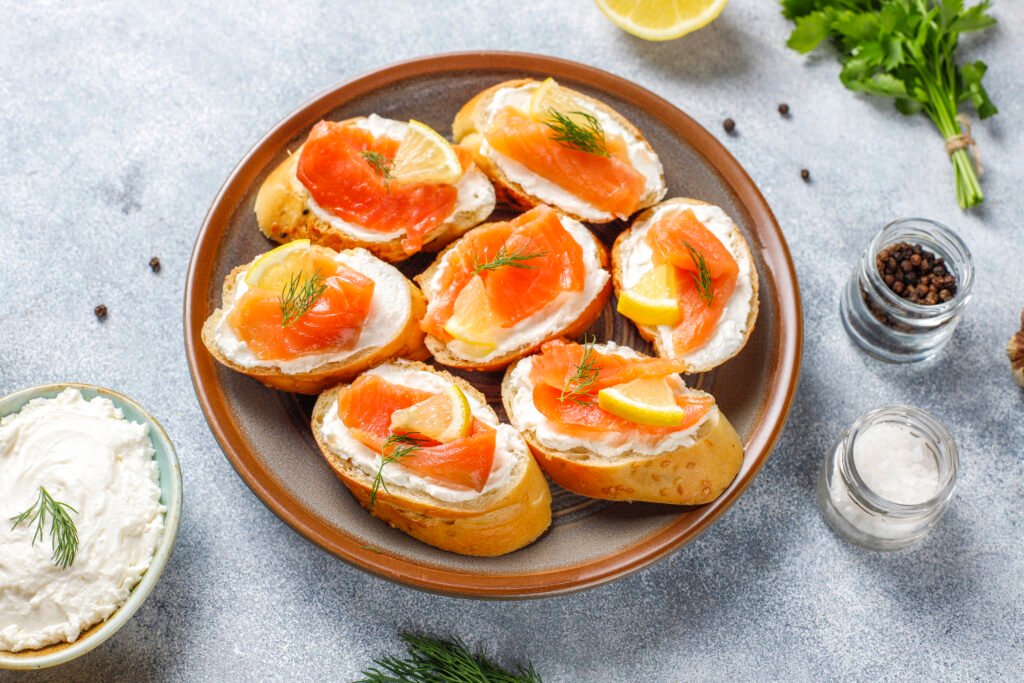
Taste Norwegian smoked salmon in Stavanger. It is unlike anything you have tried before. The salmon is rich and buttery, with a smoky flavor that will stay with you.
This tradition comes from centuries of life by the sea. Preserving seafood became an art form.
The Art of Norwegian Salmon Smoking
Traditional methods use birch or pine wood to add flavor. The fish cures in brine before slow-smoking. This slow process makes the salmon melt in your mouth.
At local smokehouses, see masters layering fillets. They turn fish into a delicacy that celebrates Norway’s seafaring history.
Where to Find the Best Smoked Salmon in Stavanger
- Stavanger Seafood Market offers raw bars with Norwegian smoked salmon and sharp sour cream.
- Try the Stavanger seafood platters at Fjordhuset, where smoked salmon is paired with dill-infused cream cheese.
- Local favorites like Brygga 13 craft traditional Norwegian fish dishes using techniques passed down for generations.
Beyond Salmon: Other Must-Try Seafood Delicacies
Explore traditional Norwegian fish dishes like klippfisk—dried cod rehydrated with hot water—or rakfisk, fermented trout with a tangy kick. These dishes reflect a culture shaped by the sea’s rhythms.
At the Fiskekaien harbor, chefs make creamy lutefisk or pan-seared halibut with dill butter. Each bite tells a story of Norway’s coastal heritage.
Surprising Sushi Scene: Japan Meets Norway in Stavanger
Sushi restaurants found along Stavanger’s old streets, is as good as that of Tokyo’s. But here: Sushi in Norway has reached new heights. It’s where Nordic sushi fusion changes the game. The mix of Arctic freshness and Japanese skill makes for bold flavors.
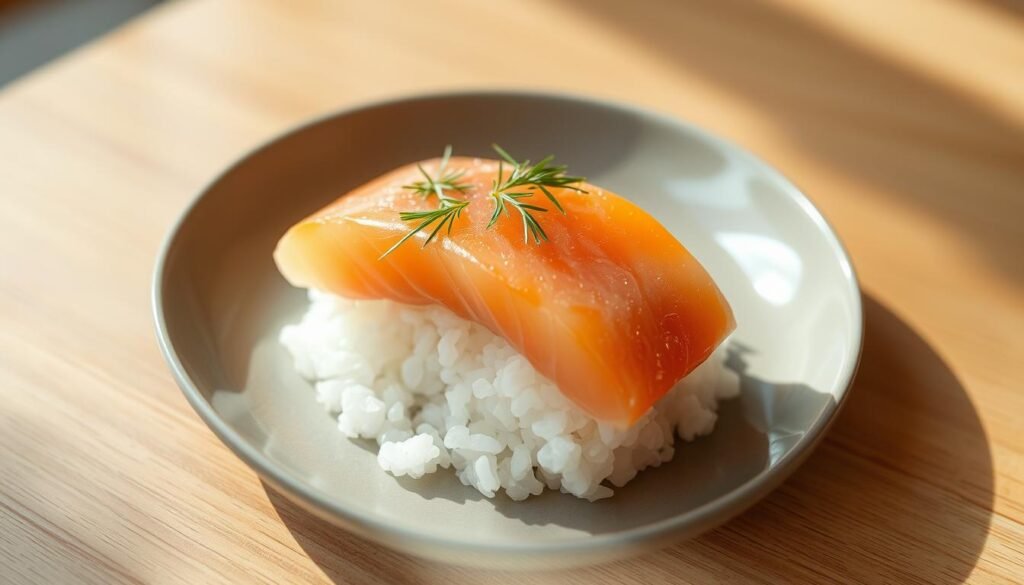
Why Norwegian Fish Makes for World-Class Sushi
Norway’s clean waters give us salmon and cod that are silky smooth. At Stavanger Japanese restaurants, chefs use these fish. They add a touch of wild fjord flavor to sushi.
Top Sushi Restaurants in Stavanger
- Sushiya En offers simple yet perfect local cod.
- Harmony Sushi Bar mixes reindeer tartare with wasabi-cream in creative rolls.
- Fjord Roll Bistro serves Nordic sushi fusion hits like dill salmon nigiri.
Fusion Dishes: Norwegian Ingredients with Japanese Techniques
A blockquote “The fjord’s bounty demands respect—not disguise,” says Chef Hiroshi Tanaka of Sushiya En. His dish pairs smoked mackerel with juniper rice, blending winter and sea.
Picture langoustine tempura with pickled rhubarb or cod roe on avocado maki. These dishes are more than fusion. They celebrate the place they come from.
Exploring Stavanger’s Food Markets and Halls
Strolling through Stavanger’s Stavanger food markets, you’ll hear lively chatter and smell fresh berries, warm bread, and smoked fish. At Torget, the city’s historic center, wooden stalls overflow with local produce Stavanger. You’ll find crisp veggies from Rogaland farms and cheeses aged nearby.
Mathallen, a modern food hall, combines modern design with tradition. Here, counters display Norwegian food halls at their best: cured meats, chocolates, and seafood bars. Vendors share stories of the day’s catch.
- Torget: Open daily, this 14th-century square is filled with seasonal fruits, handmade crafts, and local chatter.
- Mathallen: Chefs make open-faced sandwiches during weekdays. Evenings turn into wine-tasting events.
- Weekend Farmers’ Markets: From June to September, farmers sell strawberries, raspberries, and honey from local bees.
“The best fish comes straight from the boat to the market—no middlemen,” says a fishmonger at Mathallen, slicing a sliver of cod for tasting.
Mid-morning is the best time to find local produce Stavanger. Vendors welcome you with “God dag” and share their products’ stories. Evening visits to Mathallen offer a different vibe: tapas bars light up, and cured salmon pairs with local beers. Don’t forget to ask for “en kopp kaffe” (a cup of coffee). It’s a great way to enjoy the atmosphere.
From Farm to Fjord: Seasonal Eating in Stavanger
Every visit to Stavanger tells a new story in the kitchen. The city’s food scene changes with the seasons. Seasonal Norwegian food is more than a trend; it’s a way of life.
Festivals and farm-to-fork traditions bring people here all year. It’s a journey of flavors that travelers love.
Spring and Summer Culinary Highlights
Spring brings fresh asparagus and wild strawberries to Stavanger farm-to-table menus. Enjoy dishes like herb-infused cod and berry compotes. These are made with ingredients picked that morning.
At farmers’ markets by the fjord, foragers sell fresh nettles and chanterelles. These ingredients are featured in tasting menus at places like Torskefjord. The smell of grilling rakfisk, a fermented trout, fills the air.
Fall Harvest and Winter Comfort Foods
Autumn brings rich flavors to the table. Root vegetables like kålrot make velvety soups. Reindeer stewed with cloudberries warms winter nights.
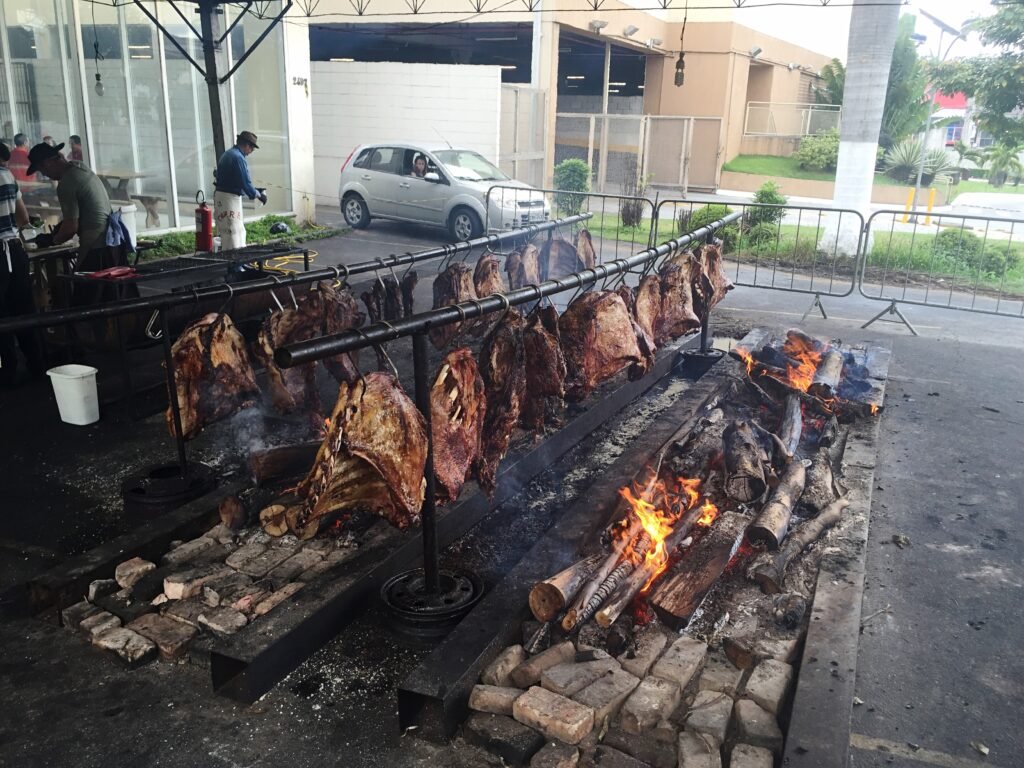
The Stavanger farm to table spirit is strong here. Local game, smoked for centuries, is found in rustic taverns like Fisketorv. Even in the shortest days, dishes like rakfisk pancakes bring joy.
Seasonal Food Festivals Worth Planning Your Trip Around
- Hadeland Fjord Food Festival: September’s celebration of Norwegian harvest festivals, featuring foraged mushroom feasts and cider tastings.
- Winter Lights Supper: December’s candlelit dinners in historic Stavanger cellars, pairing elk medallions with spiced aquavit.
These events reflect the Norwegian harvest festivals that shape the region. Imagine sipping elderflower liqueur at a twilight market. Or join locals in making traditional “kartoffelkaker” pancakes. These moments feel like home.
Culinary Experiences and Food Tours for American Visitors
A Stavanger cooking class will teach patience. Whisking butter into ribbings until they turned into lussekatt buns. These buns are a fragrant Norwegian Christmas treat. This moment shows you how Norwegian food is more than just recipes—it’s a tradition passed down through generations.
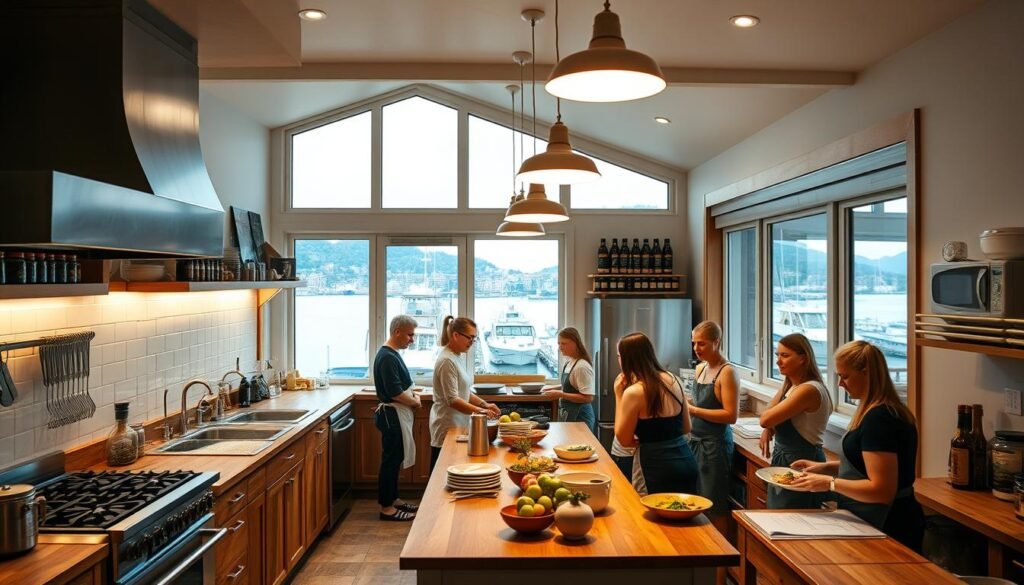
- Cooking workshops at Fisketorget Market let you master lutefisk or reindeer tartare under chef guidance
- Guided fjord-to-fork tours combine seafood harvesting demos with tastings at harborside taverns
- Foraging expeditions teach identification of cloudberries and birch syrup used in modern Nordic cuisine
Chef Ingrid Hansen of Havre restaurant says, “The best culinary tourism Norway offers isn’t just eating—it’s understanding.” Her private kitchen workshops include preparing rakfisk paired with local aquavit. Families enjoy half-day Norwegian food experiences at Utne Farm, where kids churn skyr yogurt while adults learn traditional flatbread techniques. Evening tours feature live-fire cooking demos at Stavanger Kunstmuseum’s outdoor kitchens.
“When you knead our lefse dough, you’re touching 1,000 years of history,” shared Agnes, a fourth-generation baker whose classes include recipe journals and aprons to take home.
Whether joining a 3-hour seafood butchery class or a 5-day cultural immersion, these experiences weave stories into every bite. Culinary tourism Norway thrives here—not just tasting, but tasting with purpose. Bookable through local tourism hubs or via your curated itineraries, these journeys promise kitchen-table conversations that linger longer than the lingonberry jam you’ll jar yourself.
Navigating Dietary Preferences: Vegetarian, Vegan, and Gluten-Free Options
A visit to Stavanger is a game-changer for your vegan friends who will be amazed by the vegan food Stavanger has to offer. They will love a mushroom-based “fårikål” substitute. Norwegian chefs are now blending tradition with new ideas in plant-based dishes.
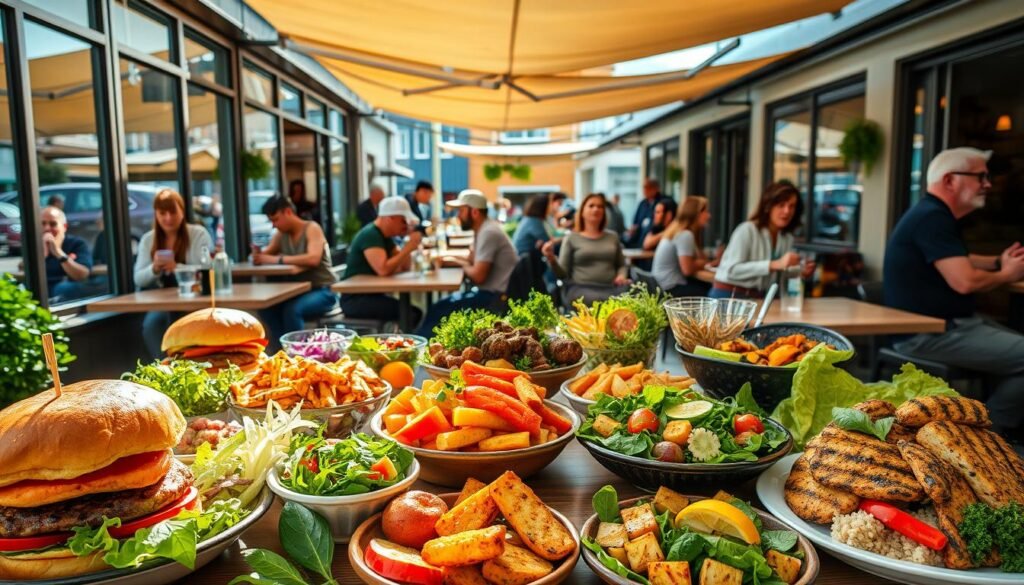
Plant-Based Norwegian Cuisine
Local ingredients like cloudberries, barley, and kålrot are key in dishes. Think barley risotto with wild herbs. Even lutefisk and fårikål get vegan makeovers.
Adapting Traditional Flavors
Many traditional dishes are actually gluten-free. Coastal spots serve bisque with gluten-free crackers. Just ask for “Jeg trenger mat uten gluten og melkprodukt” (“I need food without gluten and dairy”).
Top Dining Destinations
- Rådalen: Their buckwheat-crusted beet tartare is a hit.
- Munch: A leader in gluten-free, offering buckwheat crepes.
- Fiskekrogen: They have vegan kelp noodles with dill cream.
Stavanger’s kitchens show that dietary needs can enhance discovery. Every dish here connects old traditions with new flavors. It proves that even strict diets can lead to amazing tastes.
Conclusion: Creating Your Perfect Stavanger Food Itinerary
Every bite in Stavanger tells a story—of fjords, traditions, and innovation. Start your Norwegian culinary vacation by balancing discovery and planning. Begin with a morning at Fish Market Hall for fresh catches. Then, enjoy sushi mastery at local spots where Norwegian salmon meets Japanese technique.
A 48-hour Stavanger food itinerary could include lunch at historic seafood spots and an evening of farm-to-table tasting menus. If you stay longer, explore seasonal festivals like autumn harvest markets or winter’s smoked fish fairs. This will deepen your Stavanger gastronomy tour.
Don’t forget hands-on moments—like cooking classes blending local ingredients with global flair. This lets you savor the region’s culinary soul.
Let flexibility guide you. Wander beyond structured plans to chat with fishmongers or join fika breaks at cafés. Here, cardamom buns and kaffepaus traditions unfold. Whether you’re tracing culinary travel to Stavanger Norway for a quick escape or a slow immersion, every choice becomes a chapter in your story. Pack curiosity, leave space for serendipity, and let each meal be a dialogue with the land and its people. Your plate will remember what the fjords cannot forget.
